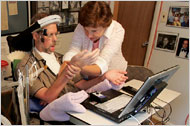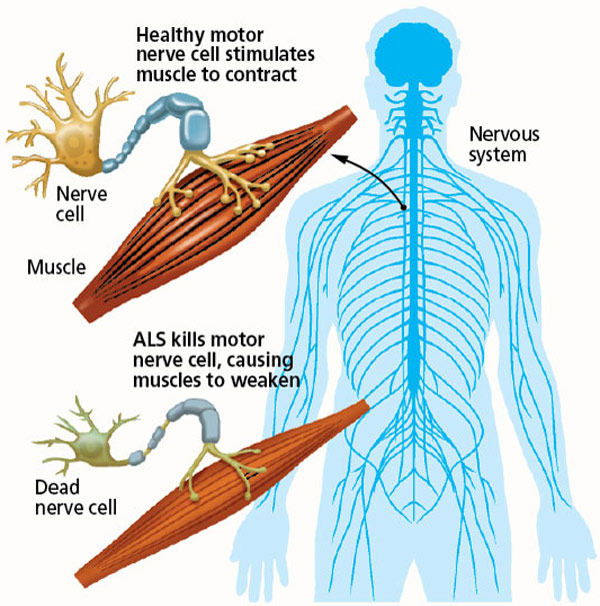ALS treatment with stem cells
What is ALS?

Amyotrophic lateral sclerosis or Motor neuron disease is a severe neurological disorder, wherein nerve cells of the spinal cord die, affecting the patient’s ability to move and breathe. This disease is also called Lou Gehrig’s disease after a baseball player who was diagnosed with ALS in 1939.
Who is affected?
Motor neuron disease develops gradually in patients from 40 to 70 years old. Men are affected more often than women. The progressive loss of functions necessary for physical health ultimately leads to lethal outcomes. A person loses motor and breathing functions. More than 90% of cases do not have a specific genetic cause, while 5-10% of cases are caused by a genetic factor.
Development of the disease
With the loss of motor neurons, a person experiences progressive muscle weakness that leads to atrophy. As for prefrontal neurons, their loss brings to cognitive impairment, altered awareness and non-adaptive social behavior.
In its classical form, the disease begins as dysfunction of any part of the body, and then slowly spreads throughout the body. Respiratory failure causes death that usually occurs on average after 3 years. According to statistics, only 4% of patients live with ALS for more than 10 years. However, there are some exceptions. For example, world-famous British scientist Stephen Hawking, who was diagnosed with ALS at the age of 21, lived with it for more than half a century and died at the age of 76.
Symptoms of Amyotrophic lateral sclerosis
Symptoms of ALS include the following conditions:
- weakness in the limbs
- clumsiness
- uncontrolled limbs movements
- muscle twitching
- problems with swallowing, speaking, salivating, and breathing
- uncontrolled emotions
- constant fatigue
- painful sensations in the advanced stages of ALS

ALS research
It has been noted that protein accumulation in the spinal cord is found in patients with ALS. Long years of research, which have been conducted at various institutions revealed that disease progression can be slowed after transplantation of neural stem cells to the person: breathing function was significantly improved, and motor functions also started to perform better.
The research was conducted on mice. As a result of the studies the mice lived about 4 times longer. Due to the research work, new light was put on the detrimental roles of non-neuronal cells in causing motor neuron death. If these events are studied then more effective therapy for ALS treatment can be found.
Stem cell therapy for ALS in UCTC
Confirmed diagnosis Amyotrophic lateral sclerosis or Motor neuron disease is an absolute indication for fetal stem cell therapy. Unique Cell Treatment Clinic has a long-standing experience in treating ALS patients even in cases where all other known methods do not give positive results.
Our treatment is effective in the progressing course of the disease with such complications as respiratory failure, including artificial lung ventilation, dysphagia and the presence of gastric stoma. Our fetal stem cell treatment allows to extend the life of patients with complicated ALS (in some cases by more than six years), improve their life quality, partially restore working capacity and maintain it at the maximum level. Especially positive treatment results are achieved if the patient begins stem cell therapy at the early stages of disease (67% success rate).
After administration of suspension containing fetal stem cells, ALS patients note reduced weakness, decrease in intensity of fasciculations and spasticity, and visible improvements of mood and appetite. 34% of our patients report a decrease in muscular stiffness, increase in the motion volume in the limbs, normalization of reflexes, decrease in the number of fasciculation zones, better tolerability of daily chores, improvement of swallowing, articulation and clarity in pronunciation.
A stable positive clinical effect after treatment lasts on average 4-8 months. Most patients need to repeat the treatment course within a year to maintain the achieved positive results. In some cases, patients need periodic courses of fetal stem cell treatment every 1,5–2 years. One treatment course includes a comprehensive diagnostic of the entire body and 2 administrations of stem cells. It is an outpatient treatment that lasts for 3 days.
